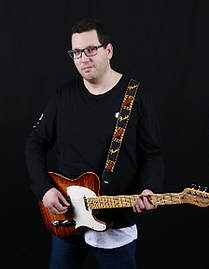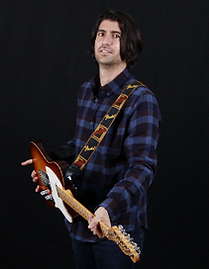
The Album
The album is a CD & Booklet pack: a disk with our original tunes to the songs of Władysław Szlengel and a designed booklet with historical facts regarding the Warsaw ghetto, Władysław Szlengel, his biography and his works.
The songs of Władysław Szlengel, a Polish-Jew poet, and lyricist, were written underground in the Warsaw ghetto and were passed from one person to another, from bunker to bunker. Tens of thousands of the Warsaw ghetto's Jews read them. Szlengel expressed in his poems the thoughts and feeling of the Ghetto's Jews and articulated the injustice, the brutality of the perpetrators and the helplessness of the ordinary Jew who had lost everything. Szlengel was killed during the Warsaw Ghetto's uprising, in May 1943, when he was in his early thirties. Before he was murdered, he succeeded to smuggle a notebook with his songs outside the ghetto. He named the notebook "What I read to the Dead", and by miracle, it survived. The songs were published in Poland in 1977. In 1987 his songs were translated by Holocaust survivor Halina Birenbaum and were published in Hebrew.

Ships Sails On (Płyną okręty)
Official Video Clip (Polish subtitles available)
Albums Reviews

Liron Teeni
Journalist and radio broadcaster
"Even though the poems were written in the darkest times of humanity, some of them feel very relevant […] this album is like a punch in the stomach."

7 Nights
"el hameshorer took a sadness bomb – poems written in the Warsaw Ghetto by Wladyslaw Szlengel, and wrapped them with an impressive album and excellent musical performance."

Leon Feldman
Radio broadcaster and editor
Kol Hacampus & Hakatze Radio
"Fantastic album […] A very powerful musical project. My stomach is throbbing […] a marvelous CD-Booklet pack."

Boaz Albert
Vocals & Guitars

Tal Goldberg
Guitars

Ido Kagan
Bass

Uri Meiselman
Drums
The Album
About the Band
An Israeli rock band that specializes in composing and reviving Poets' songs. The first album of el hameshorer :"Hayim Nachman Bialik" (2010) was dedicated to the poems of the Jewish national poet. The second album "Two Gentlemen in the Snow – The Poems of Wladyslaw Szlengel from Warsaw Ghetto" commemorates the poems of the popular poet of the Warsaw ghetto, who described the feelings of the starved, desperate Jews under Nazism.
The band performs the Hebrew songs in Israel and around the world.
A Page from the Diary of the Actions (Kartka z dziennika akcji)
Iive at Barby, Tel Aviv
Translated by Marcel Weyland
I saw Janusz Korczak today,
with the children, their final procession,
and the children were tidy and gay,
as if on a Sunday excursion.
They wore their best holiday aprons,
which today they don’t have to keep clean,
five-by-five marched the orphanage in order
- through a jungle of rounded-up men.
The town showed a terrified face,
A town strangely bare and in tatters
empty windows stared into the street
like lifeless eye sockets.
A cry came, a stray lost bird’s cry,
the knell for a death without sense,
casually reclined in their rickshaws
the lords of the circumstance.
A stomping, a shuffling, a silence,
quick words hung lost in the air,
while the church in Leszno Street nearby
stood terrified, silent in prayer.
Five-by-five walked the children in order,
no one’s hand pulled a child from the ranks.
These are orphans – so none pushed a fiver
in a navy-blue friend’s fist in thanks.
And none intervened in the process,
none stopped Szmerling to have a quick word,
none collected the family’s watches
as gifts for a soldier or guard.
Janusz Korczak walked proudly before them
head bare, in his eyes no alarm,
one child holding on tight to his pocket,
two small ones he held in his arms.
Someone rushed up – a note in his hand –
explaining, and nervously squeaking:
- You, sir, may go back! A message from Brandt –
Korczak shook his head without speaking.
He did not waste time in explaining
to those who German mercy had won
- how to drive into heads which are soulless
what means leaving a small child alone…
All those years… on the uphill roadway,
placing sunshine in little ones’ hands…
how to abandon such children, small, frightened?
He will walk with them still, to the end.
Then he thought of little King Matthew
and that fate had spared him all this,
- King Matt on his isle of wild natives –
how he would have done nothing else.
The children just entered the wagons
as if for a Sunday day out,
- that scamp with the cheeky expression,
felt today quite like a scout.
And the thought came in that brief moment,
so worthless on Europe’s great stage,
that he into our nation’s long story
writes now the most beautiful page.
That in this Jewish war without honour,
despair endless, and terror unceasing,
in this struggle for life at all costs, in
this abyss of corruption and treason,
on this front where death leaves no glory,
in this Totentanz night without end,
- he was the only proud soldier,
Janusz Korczak – the orphans’ good friend.
Our neighbours from over the wall,
who watched through the bars our slaughter -
Janusz Korczak died so that we,
Have too our own Westerplatte.









